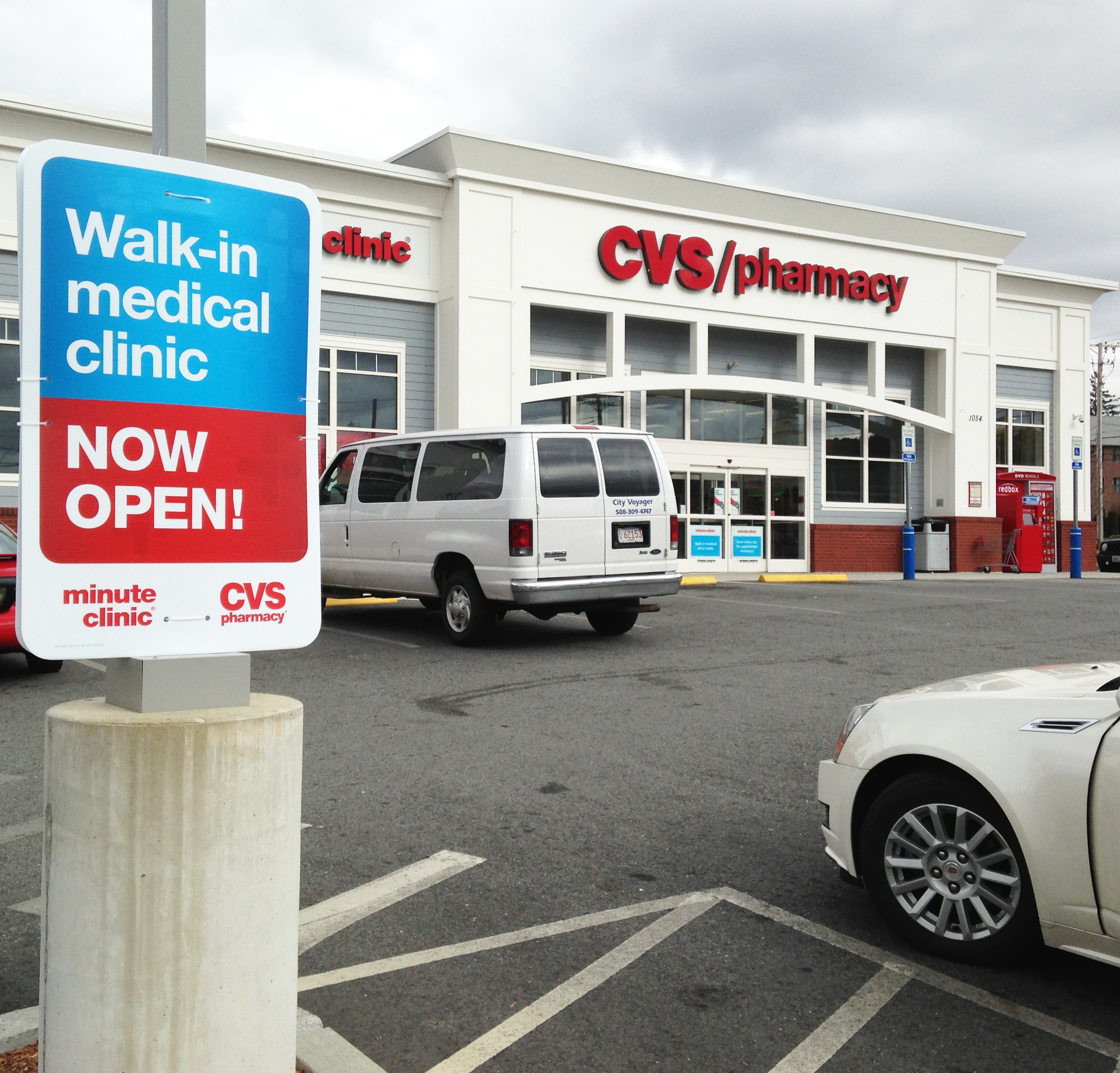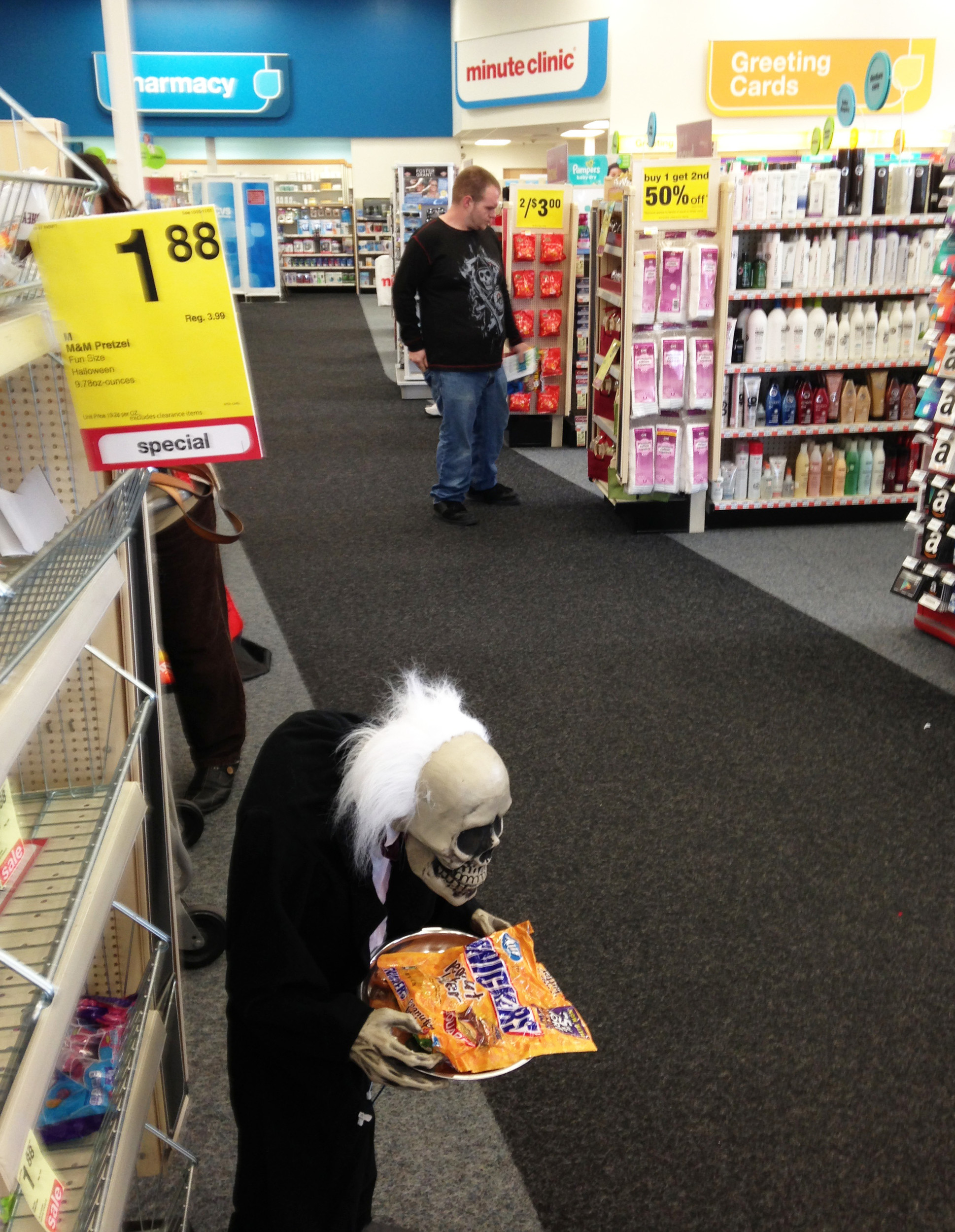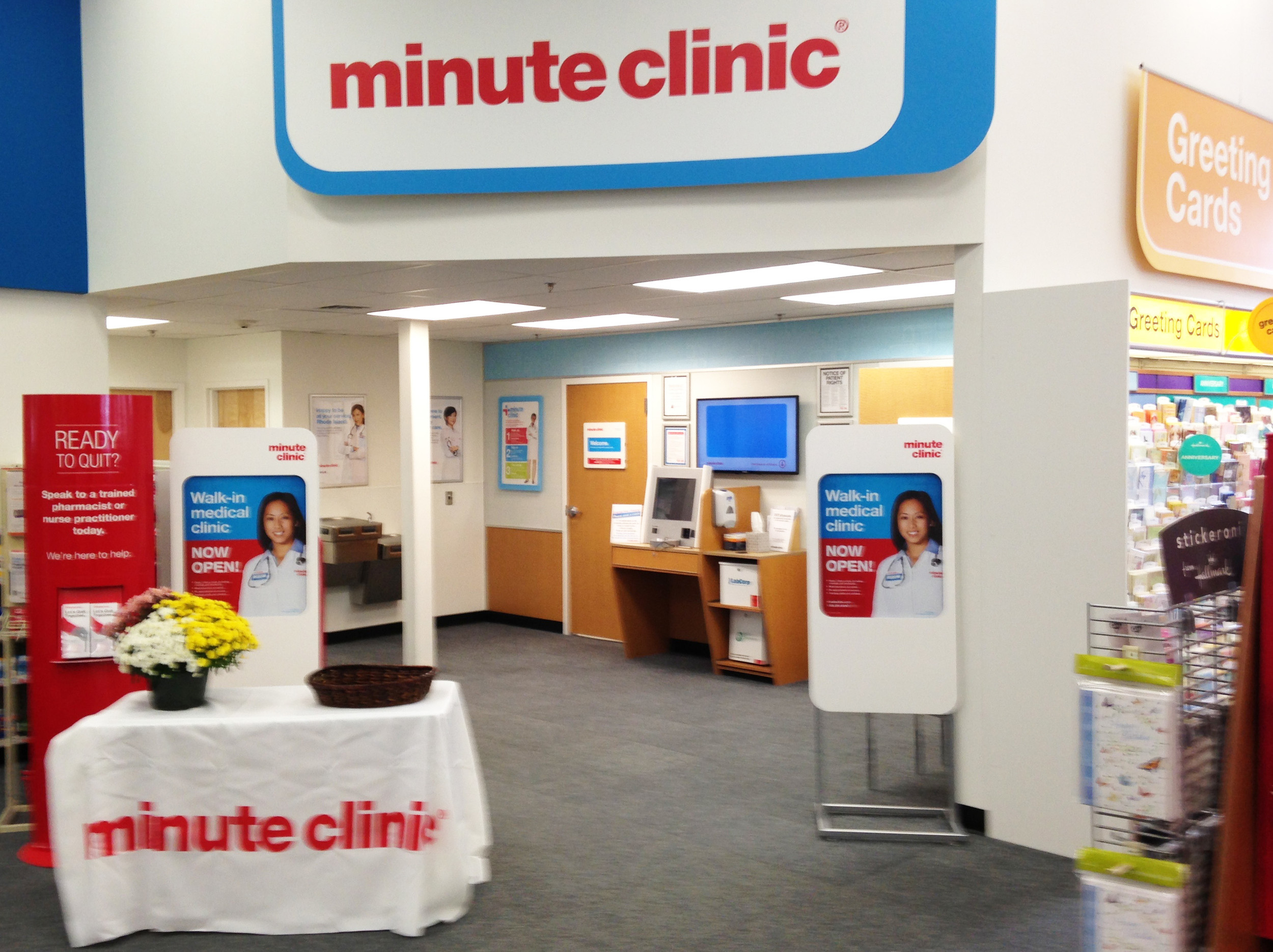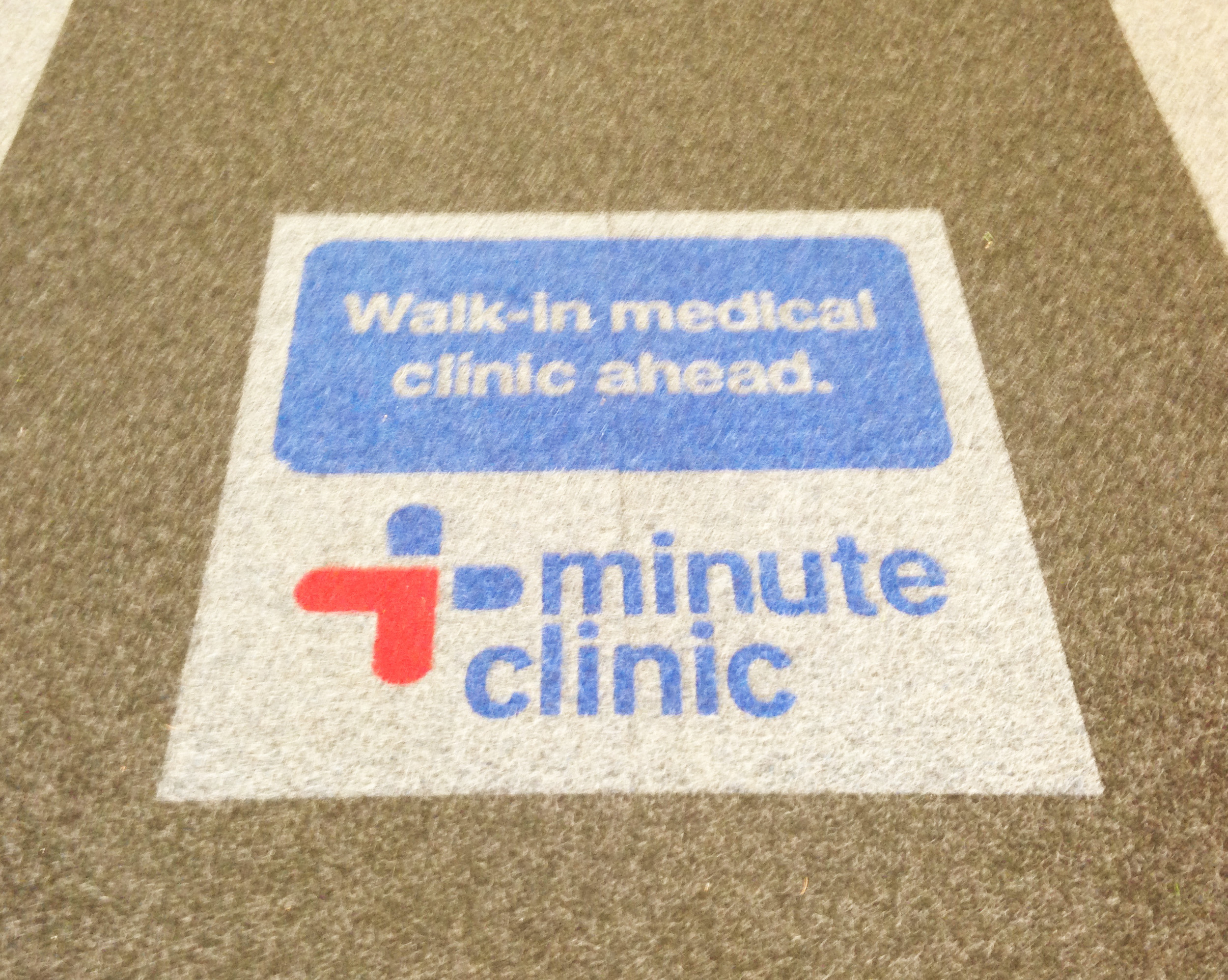Retail health, consumer value, corporate dreams
CVS Health moves into retail health market with clinics, home infusion
WOONSOCKET – It was just past noon on Halloween. The product display rows showcasing bags of candy on sale for $1.88 in the aisles at the CVS Health store on Cass Avenue, up the hill from Landmark Medical Center and Woonsocket High School, were mostly empty.
Some last-minute Halloween shoppers – including a man in business attire, clutching bags of candy against his chest, and a woman with a shopping cart – were still poring through the remnants.
Another middle-aged man, in a flannel shirt, reeking of stale tobacco smoke, grabbed four bags of candy.
Last-minute Halloween shopping? ConvergenceRI asked. “Yeah,” the man said, adding a fifth bag to his stash.
In an adjoining aisle, a CVS employee, dressed up in costume as a Disney Mouseketeer, was busy putting the new Christmas toy merchandise on the shelves, with lots of remote cars and trucks filling the rows.
“It never stops,” she said, with a laugh, in response to a question from ConvergenceRI about the changeover in retail products, as CVS geared up for the next holiday shopping season.
The gray carpet path leading toward the back of the store had a new sign painted upon it, “Walk-in medical clinic ahead,” advertising CVS Health’s newly opened MinuteClinic, the first such clinic opened in Rhode Island, with others soon to follow at its stores in Cranston, Wakefield, and North Smithfield.
[In the news cycle, with First Lady Michelle Obama, followed by President Barack Obama in Providence, including buying a take-out lunch at Gregg's, sandwiched in between two gubernatorial debates, the official opening of the first MinuteClinic in Rhode Island was not above the radar screen.]
To get to the MinuteClinic at the Cass Avenue store, customers had to pass by a three-foot ghoul, in black robes, white hair, its skull replete with hollowed-out eyes and grinning, bared teeth, holding out a tray with a bag of Snickers.
During the next 15 minutes, seven or eight customers, all women, headed down the gray carpeted path toward the MinuteClinic and the Pharmacy Department. They all cast a quick, appraising glance at the ghoul as they passed by, then walked on, past the MinuteClinic suite to make their way to the Pharmacy.
Candy and drugs, it seemed, were still the big retail items at noon on Halloween at the Cass Avenue CVS Health store.
Strategy beyond the aisle
CVS Health, with its corporate headquarters just down the road, is now the largest health care company by revenue in the United States, serving 100 million Americans a year and 5 million people every day, according to Dr. Andrew Sussman, chief medical officer at CVS Health and president of CVS MinuteClinic.
Known originally as the Consumer Value Store, where Sussman said he once worked as a “stock boy,” CVS Health now has some 943 MinuteClinics, making it the fastest-growing retail clinic chain in the country and the largest retail clinic chain in the world, according to Sussman. It also manages the pharmacy benefits for 65 million people in its programs.
The retail clinics promise to provide health care on a walk-in basis, seven days a week, without appointment, beginning at $79 a visit, according to CVS Health officials. Health insurance is accepted.
About half the patients are seen on evenings and weekends, and about half the patients don’t have access to primary care providers, according to CVS Health officials’ analysis of customer information at such clinics around the nation.
“We do not intend to replace the critical role of primary care provider,” Sussman said, speaking at a recent gathering of businesses at the R.I. Business Group on Health’s annual summit on Oct. 17 at the Marriott in Providence.
CVS Health has moved aggressively into the niche of retail health clinics, based on the growing need for primary care in the country. “There is a profound shortage of primary care throughout the country,” Sussman told the assembled crowd, saying that projections were that by 2020, the nation would be short about 40,000 primary care providers.
“If you put that together with an aging population, and an epidemic of chronic diseases and obesity, with the Affordable Care Act as backdrop, with millions of patients obtaining coverage, the shortage of primary care providers is going to continue to be exacerbated,” he said, explaining the market opportunity that CVS Health has seized.
“We think patients should have a primary care provider, and if they don’t, we’ll help them find one,” he said. “But that’s not to say we can’t be helpful on Sunday mornings with a sore throat.”
Sussman said that MinuteClinics have partnered with more than 40 health care systems across the nation to provide continuity of care. In Rhode Island, CVS Health quietly announced on Oct. 29, in a news release on MinuteClinic openings, that it had decided to partner with Lifespan in a similar arrangement.
Both Lifespan and CVS Health are planning to move to a new health IT platform, Epic, which will enable shared patient information to flow between the hospital system and the retail pharmacy, with patient’s permission.
Sussman also touted CVS Health’s decision to stop selling tobacco products and to engage in a broad smoking-cessation program through its pharmacies. “Smoking tobacco is antithetical to promoting health care,” he said.
The vision of the niche filled by MinuteClinics is to have a convenient retail clinic, available to customers without an appointment, staffed by nurse practitioners, treating “common family illnesses” and minor wounds, and common vaccinations. In addition, the retail clinics will offer a series of “wellness services designed to help patients identify lifestyle changes, including screening and monitoring for diabetes, high blood pressure and high cholesterol,” the most recent CVS Health news release claims.
And, the retail clinics are only one part of CVS Health’s corporate growth strategy. They have also moved aggressively into the home care infusion drug business, having purchased Coram LLC, a division of Apria Healthcare Group Inc., for $2.1 billion in November 2013. Coram operates 90 locations in 38 states, including a facility in East Providence doing about $50,000 a year in medical services.
CVS Health recently received approval of the deal involving the East Providence facility from the R.I. Health Services Council on Oct. 28.
Outside of Providence
One of the next MinuteClinics to open in Rhode Island will be at the CVS Health store on Eddie Dowling Highway, just off Route 146, in North Smithfield, bordering Woonsocket from the southwest. The highway is a gauntlet of fast food restaurants before entering the land of triple-deckers.
With the Cass Avenue store to the north, the two CVS Health MinuteClinics bracket the city, a former manufacturing hub that has now become a hub of poverty in Rhode Island.
Woonsocket is a city of about 41,000, one-quarter of the population lives below the poverty level, with 35 percent of children living in families below the federal poverty level. It has the lowest high school graduation rate [65 percent] in Rhode Island, and the highest high school drop out rate [22 percent], according to a 2013 community needs assessment. About 25 percent [9,885] are under 18 years of age; some 13 percent [5,437] are 65 years or older, according to U.S. Census figures. It’s unemployment rate is often a percentage point or two above the state’s rate.
Community needs surveys have consistently found that access to affordable health care is one of the biggest reported needs. Despite the outreach efforts by Thundermist, the local community health center, and its partnership with Women & Infants Hospital in Providence, Woonsocket’s rate for infants with low birth weights are the among the highest in the state, at about 10 percent of all births.
Thundermist served some 18,739 patients at its Woonsocket site in 2013, an increase from 17,541 in 2012, according to its annual report. Overall, about 36 percent were uninsured, 38 percent had Medicaid, another 8 percent had Medicare, and 18 percent had private insurance, across all of its facilities.
Landmark Medical Center, purchased by Prime Healthcare of California, a for-profit hospital system, does not list primary care as a service.
From a market standpoint, CVS Health’s MinuteClinics in Woonsocket did seem to have targeted a captive audience.









